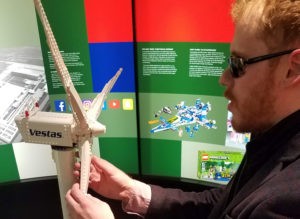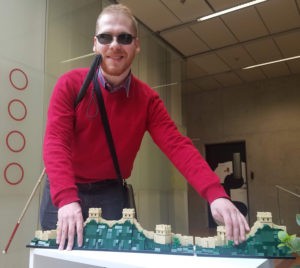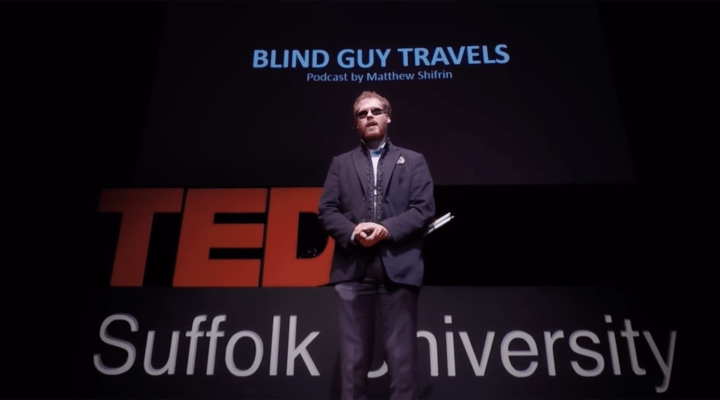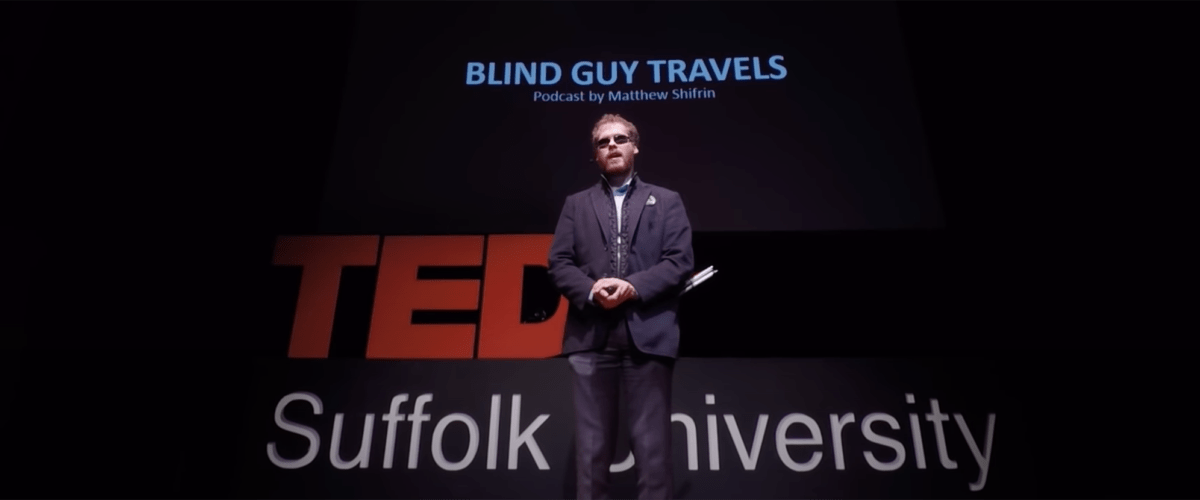Ask Matthew Shifrin about the one thing he won’t do, and his answer is simple: Live alone. That’s because Shifrin is blind.
“Things like living on my own — can it be done? Absolutely,” he said. “But does that mean I want to go out and do it? No. There’s a certain durability that’s required for a fully independent life, and I don’t want to sacrifice my productivity for that.”
At 24 years of age, Shifrin, who has been blind since birth, has accomplished more than many people twice his age, and it seems he’s always been an innovator.
Like a lot of kids, Shifrin had a love affair with Lego. But unlike most kids, he couldn’t assemble the kits on his own.
Like a lot of kids, Shifrin had a love affair with Lego. But unlike most kids, he couldn’t assemble the kits on his own; he had to rely on someone else to tell him which piece was needed next.
When he was 13, he and his babysitter, Lilya Finkel, started exploring how to make Lego instructions more accessible for blind people. Finkel, a family friend, typed the instructions into a Word document that Shifrin could then read on his Braille computer. Eventually, Shifrin and Finkel started a website called Lego for the Blind, where they posted text-based instructions for every Lego set they could find. Next, he worked with Lego to create screen reader and audio instructions, as well as a way to read them with a Braille reader.
‘Essential part of childhood’
“Lego is an essential part of childhood that blind people were missing out on,” Shifrin said. “Blind kids know that Lego is a thing, but they don’t know it’s a thing for them.”

Matthew Shifrin visiting the Lego factory in Denmark.
“Independence is a word that is thrown around a lot in the blind community, and it’s seen as a state of nirvana that you’ll achieve if you study with the right people and learn the right things, but there’s a lot of independence also in play,” he said.
In a video on the Lego website, Shifrin explained: “What Lego sets are able to do is that they are able to help you understand the world around you, in a way such that, you’re in London, let’s say, and a double-decker bus passes you by, and someone says, ‘Oh, there was a tour bus that passed us,’ you could say, ‘Oh, I know what that looks like — I built it a couple weeks ago.’ And that’s very important to blind children, because they can’t use photographs, they can’t use pictures, and as a result, they get left out of a lot of knowledge that sighted people are used to.”
Pushing the boundaries
In 2019, Shifrin gave a TEDx Talk on the Lego project. Preparing to give the talk created its own set of challenges. As a blind person, Shifrin didn’t know how to use body language — none of it meant anything to him. So he hired a coach to teach him how and when to use one gesture over another. He had to memorize where to put his hands during each part of his talk.
The son of Russian immigrants, Shifrin always has been driven to, as he puts it, “engage with the world more than it’s designed to be engaged with.”
“My parents are from Russia, and there blind people are kept in schools and employed at the schools. They aren’t in the community as much as people in the United States are,” he said, noting that even in America, up to 85% of blind people aren’t able to find employment.
“There’s a desire for stability, for security, and I think it’s about figuring out how you can get there. It’s a problem every young adult faces. But from a blindness standpoint it’s much more difficult.”

Matthew Shifrin
Following the Lego project, Shifrin started wondering what else he could experience as a blind person. He started traveling alone — something he says is incredibly stressful.
The impetus to try more
He tried other things, too — going to a movie, creating an online dating profile — and documenting it all for a podcast called “Blind Guy Travels.” As an accordionist and graduate student in classical singing at the New England Conservatory of Music in Boston, Shifrin wrote and performed the music for the podcast, and he writes and narrates each episode.
“These episodes give you a picture of what life is like,” he said. “The goal is not to show here’s how a blind person does things. Our goal is to zoom out to you as a listener. In the dating episode, our goal is not designed to just teach you about something. It’s about taking the blind experience and zooming out to a more human approach. Not just, here’s what it’s like for me to date, but what can that teach me about the world around us?”
“There’s never been a single mainstream podcast with a blind host,” Shifrin noted. “When you see blind podcasts, they are for blind people. And there’s nothing wrong with that. But they are not at the caliber of NPR Radiotopia.”
Other endeavors
Now, Shifrin is working on turning “Blind Guy Travels” into a documentary series. “Because it’s a visual medium, you have to change the stories to fit the medium,” he said.
Shifrin also is writing and will star in a one-man musical called “The Confidence Academy,” which he hopes to debut in the fall.
Shifrin also is writing and will star in a one-man musical called “The Confidence Academy,” which he hopes to debut in the fall. The play is about a blind man who lacks self-confidence.
“I wrote the musical because, one, musicals are fun, and two, it’s a one-man show and it’s an opportunity to do what I do well,” he said. “The musical gives me the opportunity to tell the story and do it in my own way.”
Shifrin’s interests and talents are diverse — he also rock climbs and hopes to start a robotics camp for blind kids. But his philosophy is clear: “I think it’s about carving out a space for yourself. The world is not designed to be accessible, but I’m carving out a space within it.”
Helen Jerman is a professional writer and editor in Dallas, who is paralyzed from the knee down due to spina bifida and is a wheelchair user as a result. She earned her bachelor’s degree in journalism and now works in corporate communications.
This article was made possible by gifts to the Mark Wingfield Fund for Interpretive Journalism.


